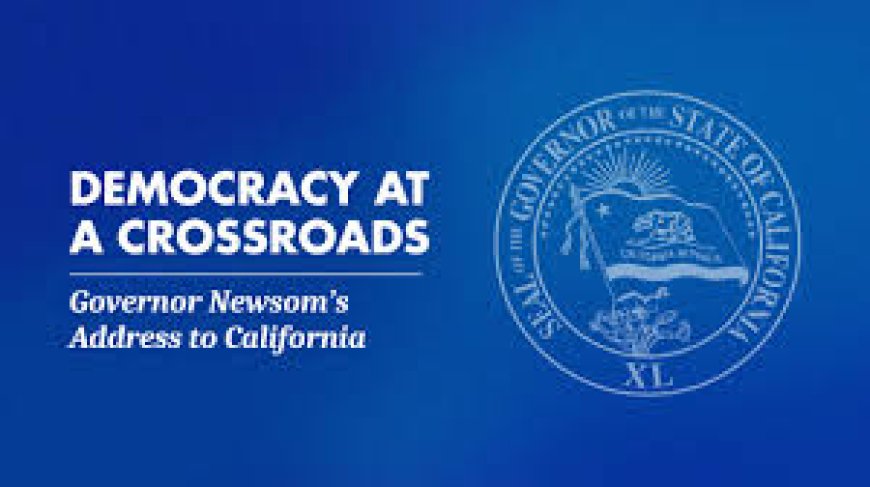Newsom Speech: Democracy at a Crossroads

Introduction
On June 10, 2025, California Governor Gavin Newsom delivered a nationally-broadcast address—titled “Democracy at a Crossroads”—from Los Angeles, responding to the Trump administration's deployment of National Guard and Marines amid protests sparked by federal ICE raids. Walking a fine line between staunch defense of democratic norms and urgent criticism of federal overreach, Newsom framed the events as a broader assault on civil liberties, urging citizens to resist authoritarian tactics.
This post explores the speech in detail: the political backdrop, key messages, implications for democracy, and what Californians and Americans should keep in mind moving forward.
1. Background: Escalating Federal Intervention
What Sparked the Speech
-
Last weekend, ICE launched sweeping raids across immigrant communities in Los Angeles
-
President Trump responded by federalizing the California National Guard and sending in active-duty Marines—over 4,000 troops—to support immigration enforcement .
-
Governor Newsom strongly opposed the move, calling it unconstitutional, unnecessary, and escalatory
-
A curfew was imposed in parts of downtown LA, civil unrest grew, and Newsom’s direct address echoed across California and the nation
2. Structure and Core Messages of the Speech
Key Themes
-
Authoritarianism & Democracy Under Threat
Newsom warned, “Democracy is under assault before our eyes,” accusing the president of orchestrating militarized intimidation rather than addressing unrest constructively -
State vs. Federal Jurisdiction
He emphasized that California and local law enforcement were effectively managing the situation, and federal troops were deployed without state consultation, raising constitutional concerns -
**Protecting Civil Liberties**
Newsom highlighted reports of indiscriminate arrests—dishwashers, gardeners, seamstresses—and stated:
“Authoritarian regimes begin by targeting people least able to defend themselves.” -
Call to Action
He urged peaceful resistance, grassroots vigilance, and civic duty, framing citizens—not officeholders—as the “antidote to fear.”
3. Speech Highlights: Turning Points
| Timestamp | Headline Point | Direct Impact |
|---|---|---|
| Opening | Declared federal deployment “unlawful militarization” | Legitimizes local emergency response |
| Mid-speech | Accused Trump of “fanning flames” & traumatizing communities | Emphasizes federal role in escalation |
| Constitutional rebuke | Highlighted actions bypassing state authority | Underlines legal challenge |
| Democratic defense call | “The most important office… is citizen.” | A direct appeal to public civic responsibility |
4. Reactions and Political Ripple Effects
✔ Support & Praise
-
California Democratic leaders and civil rights groups applauded Newsom’s stance, citing the threats to democratic norms
-
National media outlets portrayed it as a signal of resistance and a warning to other states about federal overreach
✖ Criticism & Pushback
-
Trump defenders argued the deployment was legally grounded, aimed at securing federal assets and ensuring public safety
-
Federal courts declined immediate intervention but agreed to hear California’s legal challenge
5. What This Means for Democracy
Implications for Civic Life
Newsom's speech underscores a delicate balance between public safety and state authority:
-
Precedent setting: Unilateral federal military deployment could redefine state-federal relationships.
-
Legal battle lines: Expected court challenge may shape constitutional interpretation of Presidential vs. Gubernatorial power.
-
Mobilizing public: Framing citizens as guardians of democracy encourages civic engagement.
Broader National Relevance
-
Could embolden other states to resist federal intervention in future events.
-
Sparks debate about using military resources for civil matters.
-
Puts civil liberties at center stage for midterm and 2028 elections.
6. Key Takeaways from the Address
-
Authority Matters: Federal actions circumventing local officials risk constitutional imbalance.
-
Guarding Rights: Civil protections must persist—especially amid civil unrest.
-
Unseen Soldiers: Everyday immigrant workers became symbols for constitutional risk.
-
Empowering Citizens: Newsom rallied voters and residents to democratic defense.
7. What’s Next?
Upcoming Developments
-
Legal Review in Federal Court
California’s lawsuit will examine the legality of troop deployment in domestic enforcement. -
Continued Protests & Public Response
Curfews remain in place, protests may spread if deployment continues. -
Political Fallout
Newsom's speech strengthens his profile, potentially shaping the 2028 Democratic landscape. -
National Dialogue
Raises critical questions about the use of military power within U.S. borders.
Conclusion
Governor Gavin Newsom’s “Democracy at a Crossroads” speech strikes a powerful chord—presenting an urgent defense of democratic principles, state sovereignty, and civil liberties. It also marks an important moment of confrontation between state and federal powers. As the legal and political drama unfolds, this address may well define how Americans view the use of government power in times of crisis.




























